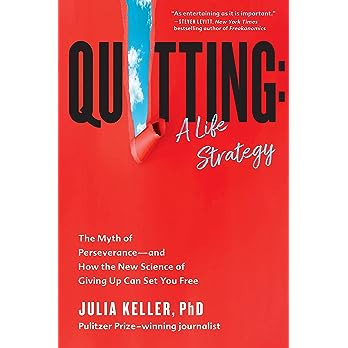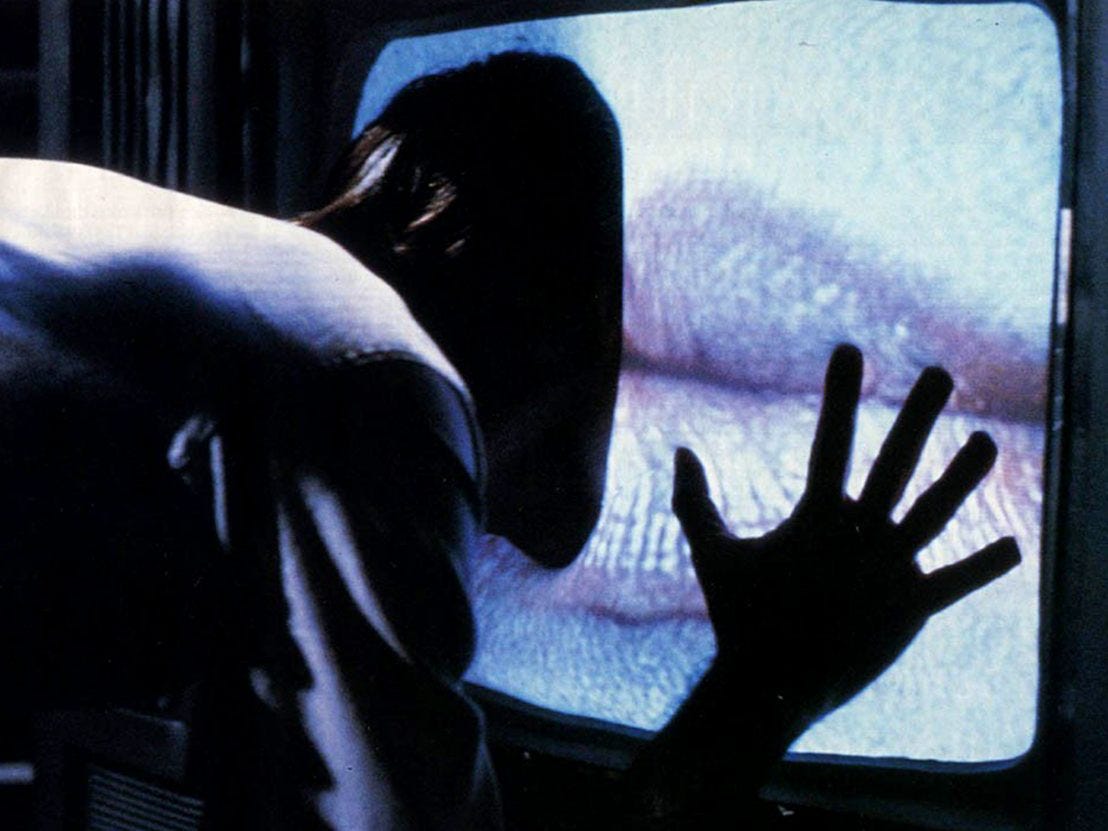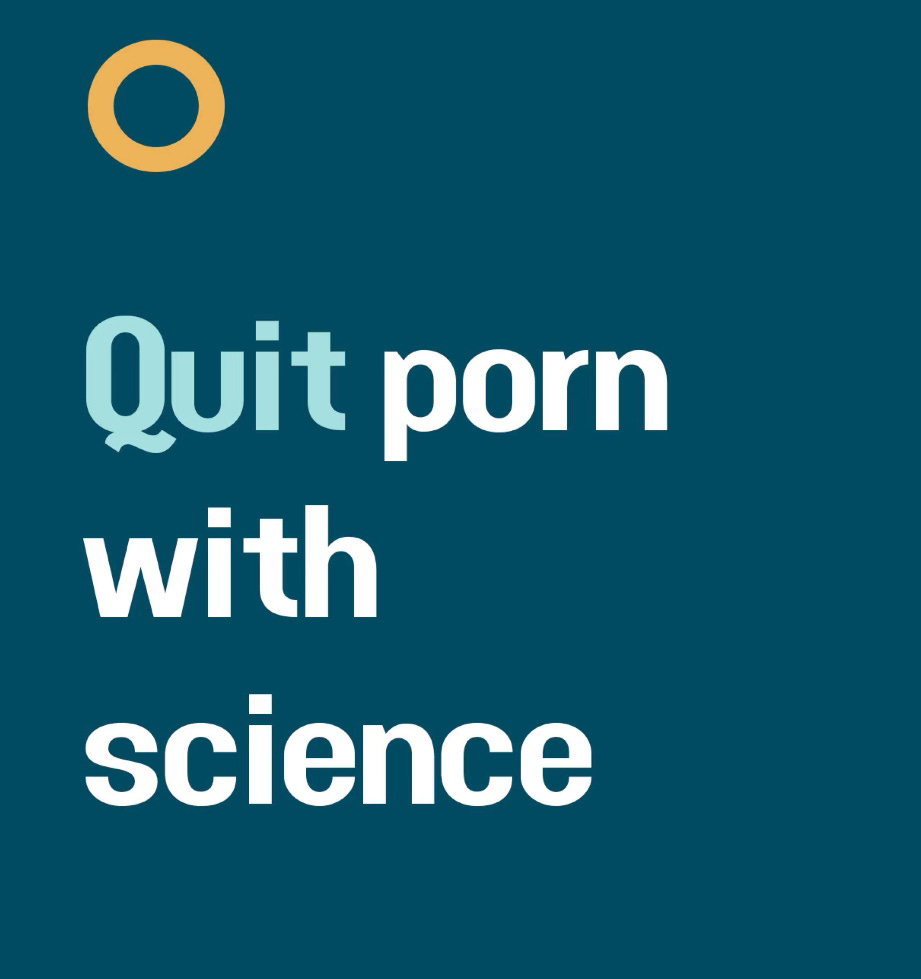Quittin' Time
Author Julia Keller Makes the Case for Quitting
My friend, the author Julia Keller, has written a new book which has come along at just the right time, as I (and many others) wrestle with the value of continuing to do what we’ve been doing, versus the challenge and allure of quitting.
That’s right, I said QUITTING. As in …
BYEEEEEEE
Julia Keller’s Book, “Quitting: A Life Strategy (The Myth of Perseverance — and How the New Science of Giving Up Can Set You Free)” can be read not only as long-overdue permission to walk away — but also as an argument for how quitting can be a smart as well as a liberating experience to set one’s life on a new path. (In the book, I share my own quitting story, which was both an ethical and liberating choice which I have not spent one moment regretting.)
Amy: You open this book with an early – and important – “quitting” story from your own life. You received important support from your own family regarding this decision.
Did this episode of quitting grad school at a tender age set you up for the dissolute life of the chronic quitter?
Julia Keller: Love that -- the "dissolute life of the chronic quitter"! It puts me in mind of comic books, bubble gum cigars, and other notoriously bad influences from my childhood. But to your question -- no. One good quit didn't make the subsequent quits any easier. I've always found it terribly difficult to let go, to walk away, to start again -- even when it's plainly the best course. That's why I decided to write this book. Other people, I've found, have the same hesitation when it comes to change: We worry about looking lazy and weak and foolish. But I say: Take the leap! Quit -- and figure out next steps later.
AD: So many of us raised in western culture (and many other cultures) are told from a very early age that we should not quit anything. (Hate soccer? Too bad, six-year-old child.) And yet, isn’t the idea of persisting through challenges an important one for children to learn?
JK: Sure. But the anti-quit bias is the dominant idea of our culture. I don't think there's any danger of a kid missing the message about perseverance. It's everywhere. It's dramatized in every Nike ad and pounded home in every Sunday School class. What gets far less publicity, however, and carries far less cultural cachet is the idea of strategic quitting: the notion that sometimes, withdrawing and recalibrating is the best strategy. We're taught to see quitting as failure: "Shame on you, you stupid loser!" But I don't think quitting is failing. I think it shows flexibility of mind -- and it demonstrates a belief that you deserve better. So -- no. I'm not worried that kids will start dropping out of soccer or flinging down their French horns if they listen to me. The grit-and-perseverance lobby will always be strong. I'd argue, in fact, that it's actually easier to stick with something - even if you hate it -- than it is to risk judgment and censure from others if you quit and try something else. It's quitting, not persevering, that needs a better PR agent.
AD: I recently ran a Q and A in my column from a gentleman who states that young adults are now “quiet quitting” their relationships. If we understand the “quiet quitting” trend to be about doing the minimum, what should we take away from the instinct to basically phone it in?
JK: Quiet quitting is a travesty and an abomination - and it has NOTHING to do with my idea of quitting as a positive. Quiet quitting means subterfuge; it means pretending to be participating in something when you're really not. Quiet quitting is a sneaky lie. By contrast, REAL quitting -- a principled decision to change your current path for another -- is a bright and bold affirmation. So your reader is right: Quiet quitting needs to be called out for what it is: a gutless hedge. (Do I sound a little wound up on this topic? I mean to! The whole quiet quitting business has irked me from the moment the phrase was coined. If you want to quit -- quit! Don't be an emotional coward or a workplace lazybones. Be a strategic, conscientious quitter.)
AD: I love some of the examples in your book showing how quitting is basically baked into an organism’s DNA; nature is evidently full of critter-quitters who quit to survive. Please indulge us, Julia, and explain how we might do well to behave less like The Little Engine That Could, and more like slime mold!
JK: Ah, slime mold -- my favorite character in my book! Slime mold is my Hamlet, my Tom Sawyer, my Jay Gatsby. Quitting, it turns out, is perfectly natural. Animals quit all the time. They live on a very thin margin of survival. If they persist in behavior that lacks an immediate payoff in nutrition, they will perish. I cite the finches on the Galapagos islands, whose diet consists of a seed inside a spiky plant. If they expend too many calories digging out a seed from a particularly tough plant, they will die. So they quit. They move on to another plant. Slime mold do the same thing. Researchers have found that slime mold don't much like bright light. So if a light is put in their path, these simple organisms will abandon the road they're on and choose another. Even slime mold understand that persevering is not noble; sometimes, it's just dumb. Nature teaches us over and over again that it's quitting, not grit, that means survival and even flourishing.
AD: You’ve included many profiles in your book of Actual People (famous and otherwise) who discuss the terrifying, liberating power of quitting. Some of these are described as “White Flag Moments” -- that crystalline moment of surrender. These are so exhilarating!
JK: I love life stories. I love hearing people recount those pivot points in their lives when they listened to their hearts and realized they must change. This may sound a little woo-woo, but I really do believe we know. We always know. Deep inside ourselves, we realize when something is wrong and we need a new direction, and we need it fast. Maybe it's a big something. Maybe it's a small something. But we know. And then it's a matter of finding the courage to make that change -- and to override all those cockamamie cultural messages that say, "Stay the course! Be gritty! Don't quit!"
AD: I’m wondering if after the publication of your book you’ve received more testimonials from people sharing their quitting stories? Are there situations where people who quit report honestly regretting their decision?
JK: Oh, yes, indeed. Me included! I quit the Chicago Tribune in 2012 because I wanted to write novels -- which I did. Over the next eight years, I wrote and published an eight-volume mystery series set in my home state of West Virginia. They sold well and paid the bills. But I wish, frankly, that I'd done what I call a "quasi-quit" -- that is, I wish I had not handled that moment as an either-or, and crafted a more desirable situation for myself at the Tribune instead of simply resigning. When they asked if I wanted to keep writing a literary column, as a part-timer, I replied loftily, "Oh, no! I must set sail upon the churning seas of solitary creation!" - or some such pretentious blather. And I found that I missed journalism. I missed daily deadlines. I missed colleagues.
Quitting does not have to be an on-off switch; it can be a rheostat dial. Negotiate! Be it a job or a marriage or whatever, you don't have to turn it into an all-or-nothing threshold. (It might end up that way -- sometimes, outcomes are out of our hands. But you can at least try to cobble together a situation that suits you better than the present one.)
And certainly, I've heard from people who regretted quitting things. People mostly regret the things they should have quit, but didn't, more than they regret the things they did quit.
Bottom line: Whether to quit or not is among the most crucial, intimate decisions we ever make. No one can do it for us. And we have to do it over and over again, throughout our lives. Abandoning one path for another IS life. Because life is change. Quitting is the most positive, joyous, life-affirming thing we ever do.
Here is a link to purchase Julia Keller's book!
DEPARTMENTS:
RJ Savage’s JUNK FOOD: Stuff I consume to feel better
Meta-Quitting
Railey writes: “Going to public school in the 90s meant that rewards often came in the form of a metal cart laden with a giant tube TV and whirring VCR. This is how I was introduced to THE LOVE BUG movies, LION KING in French, and Truffaut’s FAHRENHEIT 451. I was/am an impressionable child, so these classroom movies all made their mark, but 451 was revelatory; curated content enforced through violence and constant, complicit surveillance. Julie Christie replying breathlessly to the interrogative TV left an indelible mark on me because I, too, have been known to talk to the screen. But I’ve never, ever wanted the screen to talk back.
The screen serves as a physical reminder/manifestation of the fourth wall, the “invisible” line between player and audience, performer and viewer. When HD burst onto our LED screens in the mid-2000s I was unnerved. Why would I want to feel closer to those who’d remained safely contained within the TV dimension? Apart from televised sporting events, I still don’t understand the impulse to meld the action with the viewing experience. Does no one remember WILLY WONKA? Or VIDEODROME?
The relationship between viewer and viewed is complicated. But even the films that really interrogate the dynamic of spectacle vs. spectator do so from within the confines of the screen (thank goodness). Look at Jordan Peele’s NOPE, which weaponizes ‘the gaze.’ Or, the enduring speech from Lumet’s NETWORK: Get up out of your chairs! Go to the windows and yell, I’m as mad as hell and I’m not going to take this anymore! These movies do not reject the role of spectator, but they ask the viewer to question complicit watching. We are currently in a smartphone-driven golden age for performative solipsism in that today’s ‘influencers’ demand engaged viewers to legitimize and deepen their siloed, manufactured worlds. So, back to FAHRENHEIT 451.
Not long after 451 was pushed into the classroom, though, I saw THE TRUMAN SHOW, which really blew my little 12-year-old mind. Surveillance as content? Enforced monotony? Manufactured identities?! If it were released today, we’d be looking at years’ worth of sequels and franchising—TRUMAN DOES DALLAS; MR. TRUMAN GOES TO WASHINGTON; TRUMAN IN SPACE—but part of the enduring brilliance of the movie is the subject’s refusal to remain an object. Truman pierces the fourth wall, rejects the voice-of-God, then walks off-screen forever. He quits. The prescience is overwhelming (OFFICE SPACE and THE MATRIX came out two years after), and TRUMAN stands the test of time 25 years later for those who prefer to keep the camera’s gaze at arm’s length. So, in case I don’t see you later: Good afternoon, good evening and goodnight.”
To be clear, I have no intention of quitting - my job, or otherwise. I have been taking a long break from social media, though. And I’ve happily discovered that the less time I spend looking at a phone screen for engagement, the more time I can spend gratefully watching.
Still - it’s nice to be back, dear readers.”
Railey Jane Savage is the author of A Century of Swindles, and We Have a Winner! Find more of her work at raileyjane.com
LAURA LIKES: Where my friend Laura recommends good things:
[This week, Laura quits online competition and goes old school with a favorite game]
Laura Writes: “Online games are great fun, and I'm particularly partial to word games. I have been struggling with anxiety in the past few years and find crossword puzzles to be a great stress-relieving distraction, so whenever I find myself particularly frazzled, it's simple enough to pop open an app and work a puzzle. It turns out there's some evidence for this being a good way to reduce anxiety.
But in today's online world, it's easy to kind of kick in-person, one-on-one board games to the back of your mental closet, and I want to make the case for resurrecting the good old-fashioned Scrabble board occasionally. I rummaged around and found mine and asked my husband to play and it was great...we kind of decompressed after a long day and talked about other stuff while wrangling Rs and Cs and Ks. Now we make a point of doing this once a week. Admittedly, we both like Scrabble. There's something comforting and cozy about the feel of the wooden tiles and racks, the vaguely retro look to the whole board, and it reminds us of playing the game with grandparents when we were kids. At any rate, you can buy extremely fancy versions or extremely budget versions, in lots of variations. I also donate board games and books to the local VA hospital a couple of times a year and almost always pick up a Scrabble set to include in that. It's a fun way to spend some quality one-on-one time with someone and a good way to take a break from screen time.
[Laura Lorson lives in Lawrence, Kansas]
What’s New?
Emily Mason’s TARGETED UPSELL: What the Internet wants me to buy
Emily writes: “ As I contemplate various quits, I find myself being bombarded with ways to quit things.
Specifically, habit trackers!
These are apps that you install on your smart mobile device that help you keep track of how your quit is going. And it turns out, there are a lot of habit trackers to choose from!
Like, a lot of habit trackers to choose from!
Very…specific habit trackers to choose from!
There are apps just for quitting vaping!
Apps just for quitting alcohol!
Apps just for quitting….other things!
(Heaven forbid you forget to close this app out the day you lose your phone…)
Great!
This barrage of helpful apps does not feel at all overwhelming and exploitative!
(Please excuse me while I take a break from all the habit trackers)
Why am I seeing this?
Out of curiosity I looked up “quit” in the app store. The results were spectacular.
Did they sell me?
Weelllllllll, yes and no.
Don’t get me wrong, I am all about quits, and I think it’s important to find ways to make them easier so that you actually, you know, stick to them.
Some of the apps I came across seem genuinely helpful in the service of quitting. Apps like Habit Tracker, Tally the Anything Tracker, and Since let you track, well…anything, from bad habits to good habits to the last time you did laundry or took your pill so you don’t forget!
However, most of the habit-tracking aides I came across scream “total racket.”
These hyper-specific-very-helpful apps aren’t free. 90% of the ones I came across all mentioned “in-app purchases.”
Translation: the download may be free, but this is a subscription service! For help with one very-specific thing!
I have to wonder…do they actually want you to quit the very specific thing? I mean, you successfully quit, they lose a user. The cynic in me suspects that at best, these hyper specific apps don’t work, and at worst… there might be something more nefarious going on.
So, I will pass on these, and give “Quitters,” my favorite podcast, a listen instead.”
*** Thank you, dear readers. If you like what we’re doing, please shoot us a “heart” below. I’d also love for you to share your own quitting story in the comments section below (not as a reply to this email).
Love,
Amy












I retired at the end of 2018 after a 42-year career in insurance with the same company. Those were 30 of the best years of my life! I had to get thoroughly miserable before I could bring myself to retire. I gave six months notice. During those 6 months I returned to journaling to try to understand why I was so deeply conflicted about retirement. I could not understand why it would be a cause for celebration. It felt like a failure to me. I now journal daily as part of living my best creative life. The timing of my retirement worked out perfectly. I wish I’d had this book to read at the time.
I'm always grateful when your writing arrives. Thank you.